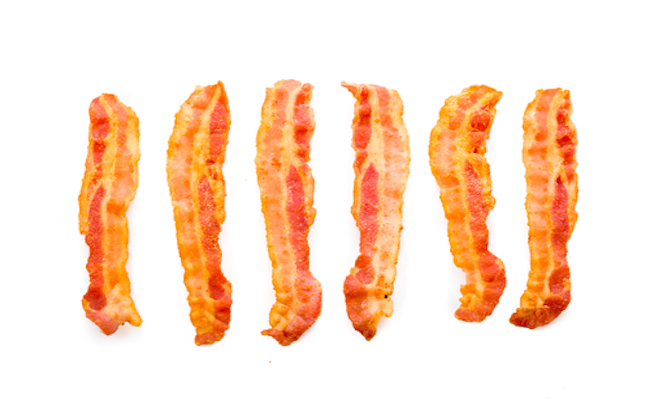
If there’s one food meat eaters can’t live without, it’s bacon. You can fry it up and eat it as a side, in a sandwich or even sprinkle it over reasonably healthy foods to make them taste waaaaaay better. It’s magical stuff, the only true superfood. That became completely obvious this week when talk of a bacon shortage tore across the internet.
“Could this be true?” we all wondered. “What would a bacon-less world look like?”
It definitely would be a much sadder place. Who wants a lettuce and tomato sandwich?
The headlines were indeed troubling. “The Looming Disaster of a US Bacon Shortage” read Forbes. And it didn’t end there, this story was picked up by pretty much every reliable news source in the country. Bacon + panic = clicks, after all. The problem was that it was fake news. Or rather, a misguided viral marketing stunt from the Ohio Pork Council.
The report everyone was citing was from the U.S.D.A and the aforementioned Ohio Pork Council. The cause for the concern was a claim that frozen pork belly reserves were at their lowest numbers in the last fifty years (this is actually true). Because people are eating bacon at such a rapid rate, the reserves were depleted from 35 million pounds at the end of 2015 to just 17.8 million at the end of 2016. If true, those are some really troubling numbers for fans of the greasy, crunchy, savory meat. They even created a website called Baconshortage.com to spread the word.
“Today’s pig farmers are setting historic records by producing more pigs than ever,” said Rich Deaton, the president of the council.“Yet our reserves are still depleting.”
The so-called shortage is due to the recent popularity of pork belly and other pork by-products that restaurants previously hadn’t served. People seem to start salivating whenever they read the words “pork belly” on a menu (and rightly so). But, fear not. Even with the increased demand for pork, we won’t run out any time soon, there will be no mad dash to grab the last package of maple-smoked, thick-cut bacon, and there certainly won’t be any bacon rationing.
You might, however, have to pay a little more for pork belly if it remains a popular menu item. Even though the reserves are depleted, we have nothing to fear. Instances like this are literally why reserves exist.
“While bacon may become more expensive for consumers, rest assured the pork industry will not run out of supply,” said Deaton. “Ohio farmers will continue to work hard to ensure consumers receive the products they crave.”

“To imply that there’s going to be some shortage of bacon is wrong,” Steve Meyer, the vice president of pork analysis for EMI Analytics, told The New York Times. “There’s plenty of hogs coming. There’s going to be plenty of bacon.”
The goal of BaconShortage.com wasn’t to create widespread panic. It was supposed to just be a viral marketing campaign. Spark a little fear, have a little fun (this is why viral marketing is dumb).
“We can’t control how the news is interpreted,” said Deaton.
At least now we know that our burgers won’t be without bacon any time soon. How would we have survived without it? Unfortunately, we can’t look to BaconShortage.com for answers. The site is no longer working.






